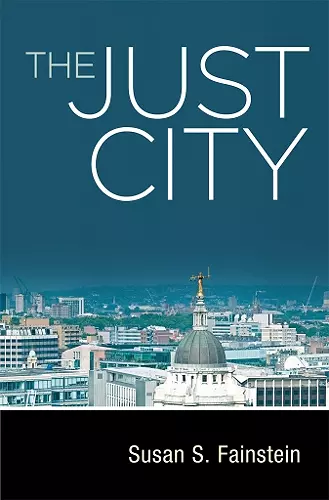The Just City
Format:Paperback
Publisher:Cornell University Press
Published:23rd Jul '10
Should be back in stock very soon

For much of the twentieth century improvement in the situation of disadvantaged communities was a focus for urban planning and policy. Yet over the past three decades the ideological triumph of neoliberalism has caused the allocation of spatial, political, economic, and financial resources to favor economic growth at the expense of wider social benefits. Susan Fainstein's concept of the "just city" encourages planners and policymakers to embrace a different approach to urban development. Her objective is to combine progressive city planners' earlier focus on equity and material well-being with considerations of diversity and participation so as to foster a better quality of urban life within the context of a global capitalist political economy.
Fainstein applies theoretical concepts about justice developed by contemporary philosophers to the concrete problems faced by urban planners and policymakers and argues that, despite structural obstacles, meaningful reform can be achieved at the local level. In the first half of The Just City, Fainstein draws on the work of John Rawls, Martha Nussbaum, Iris Marion Young, Nancy Fraser, and others to develop an approach to justice relevant to twenty-first-century cities, one that incorporates three central concepts: diversity, democracy, and equity. In the book's second half, Fainstein tests her ideas through case studies of New York, London, and Amsterdam by evaluating their postwar programs for housing and development in relation to the three norms. She concludes by identifying a set of specific criteria for urban planners and policymakers to consider when developing programs to assure greater justice in both the process of their formulation and their effects.
[Fainstein's] work deepens, enriches, and extends deliberative planning theory in complementary rather than antagonistic ways. Like the idea of justice itself, The Just City is not the last word concluding a debate. More important, it is a trenchant, penetrating, and reasoned contribution to precisely that discursive and contested, but necessary and fruitful deliberative process that fuels the hope for progress toward realization of the just city.
-- Sarah J. Peterson * Journal of Planning Education and Research *Susan Fainstein's book is the result of some 20 years of intense research and thinking on the subject of the 'just city,' and it seems likely to me to become something of a classic.... Fainstein's slightly deadpan style serves only to make her accounts more compelling. A recent history of planning in London, written with equality, democracy and diversity in mind, is really useful as a teaching tool. Here the Docklands development, Coin Street and the 2012 Olympics are placed under scrutiny, with the last of those three, perhaps not surprisingly, receiving poor marks on the grounds of equity not least because the 'huge expenditure involved took away resources from other parts of London and the country more widely without providing them any benefits beyond the glory of hosting the Games.'... She notes that there are two possible responses to the injustices illustrated by the book. The first is to recognize the impossibility of achieving even small amounts of justice within the dominant system of global capitalism. The second, which is one that Fainstein herself adheres to, is that much can be achieved through incremental change. The book's final chapter is therefore devoted to a discussion of policies that are conducive to social justice in cities. Her vision is of a world where market forces no longer dominate decisions about city planning and justice drives the world of policy.
-- Flora Samuel * Times Higher Education Supplement *The just city is one in which equity, democracy, and diversity are important considerations. This is in contrast with the city as growth machine. Fainstein examines three cities: New York, London, and Amsterdam. She provides a history of post–World War II planning and then focuses on fairly recent cases of development in each. Her goals, though modest, are important if growing inequality in urban areas is to be reversed. Recommended.
* Choi- Winner of Cowinner, 2011 Paul Davidoff Book Award (Associati.
ISBN: 9780801476907
Dimensions: 235mm x 155mm x 16mm
Weight: 454g
224 pages